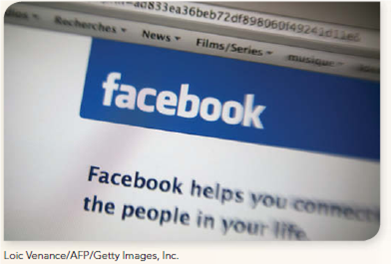
Management 13th Edition by John Schermerhorn,Daniel Bachrach
Edition 13ISBN: 978-1118841518
Management 13th Edition by John Schermerhorn,Daniel Bachrach
Edition 13ISBN: 978-1118841518 Exercise 5
KNOW RIGHT FROM WRONG
Subtleties in social media postings can contribute to discrimination in the recruitment process.
Social Media Searches Linked with Discrimination in Hiring

It's no secret that a growing number of employers (more than a third) browse the Web and follow social media to gather information and impressions about job candidates. It is also well known that inappropriate postings can hurt you. So much so that people are increasingly trying to edit the bad things out of their public profiles. New research reported from Carnegie Mellon University, however, also suggests that subtleties in social media postings can contribute to discrimination in the recruitment process. One of the researchers, Professor Alessandro Acquisti, said: "There is so much information we reveal about ourselves online, sometimes in ways we do not even realize."
Researchers distributed 4,000 résumés to job posting sites and associated the résumés with Facebook profiles offering subtle cues-background photos and quotes, for example, on the candidates' religion (Muslim or Christian) and sexuality (gay or straight). Results showed that Muslims (2%) were less likely to be called for follow-up interviews than Christians (17%). Sexuality cues made no significant difference in callback rates. It's against U.S. employment law to use religion or sexuality as hiring criteria, but the researchers point out that discrimination based on social media investigations can be unconscious rather than intentional, with the employer showing the bias without realizing it. Professor Acquisti says: "By and large, employers avoid asking questions about these traits in interviews. But now technology makes it easier to find that information." Other social media cues at risk of discriminatory behavior are photos of women showing pregnancies or children, and applicants with names often associated wiThethnic, racial, or religious communities.
WHAT DO YOU THINK
Facebook offers privacy settings to shield from public consumption information intended only for friends. But does this go far enough to protect individual privacy Is it ethical for employers to use social media to "peek" at the personal lives of prospective candidates Should there be laws preventing them from doing so What about individual responsibility Given so much publicity on social media use by recruiters, shouldn't job seekers be informed and aware enough to screen out potentially harmful and discriminatory information Are these job seekers at fault if negative consequences result when they don't
Subtleties in social media postings can contribute to discrimination in the recruitment process.
Social Media Searches Linked with Discrimination in Hiring

It's no secret that a growing number of employers (more than a third) browse the Web and follow social media to gather information and impressions about job candidates. It is also well known that inappropriate postings can hurt you. So much so that people are increasingly trying to edit the bad things out of their public profiles. New research reported from Carnegie Mellon University, however, also suggests that subtleties in social media postings can contribute to discrimination in the recruitment process. One of the researchers, Professor Alessandro Acquisti, said: "There is so much information we reveal about ourselves online, sometimes in ways we do not even realize."
Researchers distributed 4,000 résumés to job posting sites and associated the résumés with Facebook profiles offering subtle cues-background photos and quotes, for example, on the candidates' religion (Muslim or Christian) and sexuality (gay or straight). Results showed that Muslims (2%) were less likely to be called for follow-up interviews than Christians (17%). Sexuality cues made no significant difference in callback rates. It's against U.S. employment law to use religion or sexuality as hiring criteria, but the researchers point out that discrimination based on social media investigations can be unconscious rather than intentional, with the employer showing the bias without realizing it. Professor Acquisti says: "By and large, employers avoid asking questions about these traits in interviews. But now technology makes it easier to find that information." Other social media cues at risk of discriminatory behavior are photos of women showing pregnancies or children, and applicants with names often associated wiThethnic, racial, or religious communities.
WHAT DO YOU THINK
Facebook offers privacy settings to shield from public consumption information intended only for friends. But does this go far enough to protect individual privacy Is it ethical for employers to use social media to "peek" at the personal lives of prospective candidates Should there be laws preventing them from doing so What about individual responsibility Given so much publicity on social media use by recruiters, shouldn't job seekers be informed and aware enough to screen out potentially harmful and discriminatory information Are these job seekers at fault if negative consequences result when they don't
Explanation
In the present case it is given that gro...
Management 13th Edition by John Schermerhorn,Daniel Bachrach
Why don’t you like this exercise?
Other Minimum 8 character and maximum 255 character
Character 255


